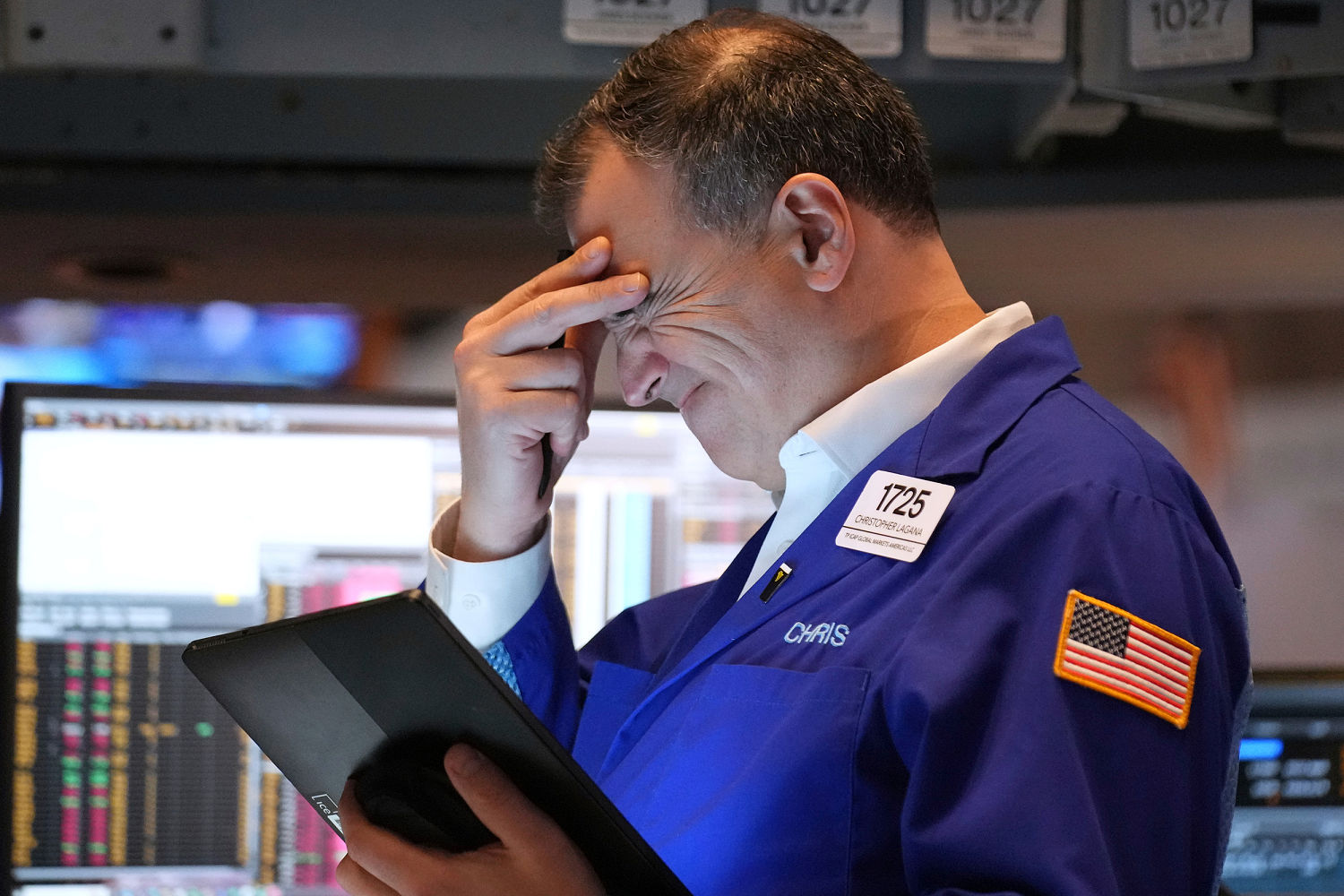Stocks close out their worst quarter since 2022 amid tariff uncertainty

Two of the three major U.S. stock indexes just wrapped up their worst quarter in well over two years. The third barely avoided the same fate.
The S&P 500 dropped more than 4.5% for the first quarter of 2025 as of Monday’s close, and the tech-heavy Nasdaq plummeted 10.4%. The Dow Jones Industrial Average settled 1.3% lower and recorded its first back-to-back monthly loss since October 2023.
The declines on all three indexes come days before President Donald Trump is set to unveil a new slate of wide-ranging tariffs, extending ongoing trade policy turmoil that has kept investors guessing for months.
The broad-based S&P 500 fell briefly into correction territory Monday, meaning a 10% slide from its last high. The index regained some ground late in the day, but not enough to dodge its worst monthly percentage drop since December 2022.
The index’s first-quarter stumbles ended a streak of five straight winning quarters, while the Nasdaq wiped out more than half of last year’s gains over the last three months. Amazon, Apple, Microsoft, Alphabet, Nvidia, Tesla and Meta, known on Wall Street as the “magnificent 7,” have lost more than $2 trillion in market value collectively since the start of the year.
The last time U.S. markets stumbled as badly was in the middle of 2022 after Russia’s late-February invasion of Ukraine, shocking the global economy as Western nations hit Moscow with severe sanctions and commodities like oil and grains shot up in price.
The first quarter of this year saw geopolitical upheaval of a different sort, as investors have struggled to digest the series of major U.S. policy changes since Inauguration Day. The quarter marked the S&P’s worst performance versus the rest of the world since 1980, according to Dow Jones — at a time when a number of foreign stock markets have surged.
The Euro Stoxx 600 index, which tracks companies across 17 countries, has risen 5% to start the year as the S&P 500 dropped by roughly the same amount. In fact, the Stoxx 600 has just had its best quarter against the S&P since 2015, according to FactSet data. The U.K.’s FTSE 100 also rose more than 5% in the same period. The MSCI China index, a benchmark of 580 Chinese stocks, ended the first quarter up 16%.
Markets overseas have popped for a range of reasons, with some but not all related to the Trump administration’s actions. The European Union and U.K. have taken steps to trim regulations and hike military spending in response to White House moves, boosting shares of defense companies in both places and helping power markets there overall. In China, the strong performance has been more a reflection of local factors, including economic stimulus and enthusiasm around home-grown AI startups.
It’s not a rosy picture everywhere, though. Japan’s flagship stock index sank 10% in the first quarter over fears about slowing manufacturing and an export economy that could be hurt by Trump’s still-expanding tariff agenda.
The president is set to open another front in his trade war Wednesday, a date he has dubbed America’s “Liberation Day” from the purported abuses of its top trading partners, many of them longtime allies. Trump has vowed so-called reciprocal tariffs aimed at equalizing trade barriers between the U.S. and a number of countries that sell to Americans more of their own goods and services than those they buy from the U.S.
But with the details of this policy program still up in the air days before it’s set to roll out, business leaders and consumers have been grappling with widespread uncertainty over the coming impact. Nearly 900 nonfinancial companies mentioned tariffs on recent earnings calls, S&P Global Market Intelligence said this month.
“This is truly ridiculous,” one manufacturing executive said in an anonymous Federal Reserve Bank of Dallas survey published Monday. “I have been in business for 50 years as of next year, and never have I seen such uncertainty in the market. It is very difficult to plan and make decisions.”
But things could still turn around in the months ahead, some analysts say.
“Once tariffs are announced on April 2, negotiations to soften them can begin,” researchers at the investment bank UBS said in a note to clients Monday. “Progress toward a budget reconciliation bill could refocus attention on market-positive aspects of the Trump agenda.”
You may be interested

Miley Cyrus, Ed Sheeran, Haim
new admin - Apr 04, 2025[ad_1] Welcome to our weekly rundown of the best new music — featuring big singles, key tracks from our favorite…

The AI industry doesn’t know if Trump just killed its GPU supply
new admin - Apr 04, 2025AI companies can’t figure out if the Trump tariffs are about to decimate them – and the fact that no…

This week on “Sunday Morning” (April 6)
new admin - Apr 04, 2025The Emmy Award-winning "CBS News Sunday Morning" is broadcast on CBS Sundays beginning at 9:00 a.m. ET. "Sunday Morning" also streams…































